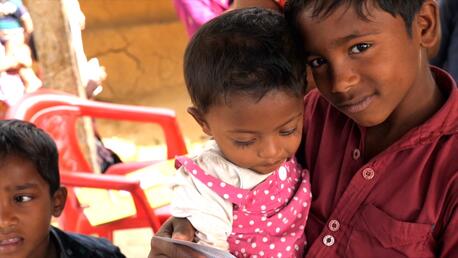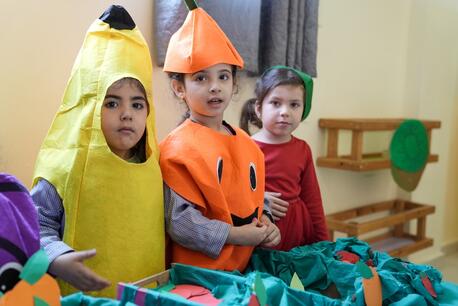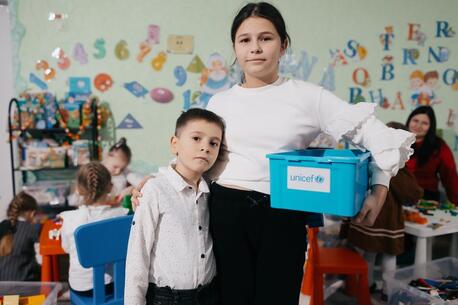
Rohingya Refugee Crisis Reaches Seven-Year Mark
As refugees in Cox's Bazar, Bangladesh, struggle to withstand major threats to their health and well-being, conflict and crises continue back home in Myanmar. UNICEF teams are on the ground in both countries doing what they can to make sure children and families are supported and protected. Donor support is needed to help sustain and scale these efforts.
A protracted emergency: UNICEF's ongoing support for Rohingya refugees in Bangladesh amid rising malnutrition, other threats to children
On Aug. 25, 2017, hundreds of thousands of Rohingya families started pouring into Bangladesh, fleeing by boat or on foot to escape brutal violence and persecution in Myanmar's western coastal state of Rakhine.
In a matter of days, there were over 700,000 new refugees sheltering in Cox's Bazar, a district of Chittagong on the Bay of Bengal. They joined the refugees who were already there, the result of previous waves of displacement, bringing the total Rohingya population to nearly 1 million.
Seven years later, the Rohingya refugees are still there — still exiled from their home country, their futures uncertain; living in temporary shelters in congested camp settings that are highly vulnerable to extreme weather and other climate shocks, and completely dependent on humanitarian assistance.
Working with the interim government of Bangladesh and other partners, UNICEF has been and continues to provide water and sanitation to refugee children and families, support diarrheal treatment centers, enable access to other health and nutrition services for children and pregnant women, ensure children's access to quality education and support children affected by violence, abuse and neglect with protection and response services.
UNICEF also provides treatment for severe acute malnutrition (SAM) in the form of Ready-to-Use Therapeutic Food (RUTF). The number of Rohingya refugee children suffering from SAM, also called child wasting, has spiked in recently months, prompting UNICEF to ramp up supplies.
“Bangladesh’s continued support to the refugee population — especially children — is both commendable and critical,” UNICEF Executive Director Catherine Russell said. “Over the past 12 months, we have been increasingly concerned about the security situation in the camps and reports of child rights violations. We stand ready to support the new interim government of Bangladesh to ensure that these children are protected and have access to critical services.”
Learn more about what UNICEF is doing to help Rohingya refugees.
UNICEF also responding to crises for children inside Myanmar
Meanwhile, conflict continues to intensify in Rakhine. There has been a recent surge in the number of civilian casualties and further displacement of children and families, prompting more people to seek shelter and protection in Bangladesh.
Humanitarian crises are multiplying all across Myanmar, in fact. UNICEF reports that conditions are dire and rapidly deteriorating, with health and education systems near collapse.
UNICEF teams inside Myanmar are doing what they can to protect children's rights and support their access to essential services. Yet humanitarian access remains extremely challenging.
UNICEF is calling on all parties to conflict in Myanmar to uphold their obligations under international humanitarian law and international human rights law to protect civilians, particularly children, and ensure their safety and well-being.
UNICEF is also calling for safe and unimpeded access to deliver humanitarian aid by all humanitarian actors.
Learn more about UNICEF's mission in Myanmar.
UNICEF works in over 190 countries and territories to create a more equitable world where all children are healthy, educated, protected and respected. Support UNICEF. Donate today.
HOW TO HELP
There are many ways to make a difference
War, famine, poverty, natural disasters — threats to the world's children keep coming. But UNICEF won't stop working to keep children healthy and safe.
UNICEF works in over 190 countries and territories—more places than any other children's organization. UNICEF has the world's largest humanitarian warehouse, and when disaster strikes, can get supplies almost anywhere within 72 hours. Constantly innovating and always advocating for a better world, UNICEF works to ensure that every child can grow up healthy, educated, protected and respected.
Would you like to give all children the opportunity to reach their full potential? There are many ways to get involved.





